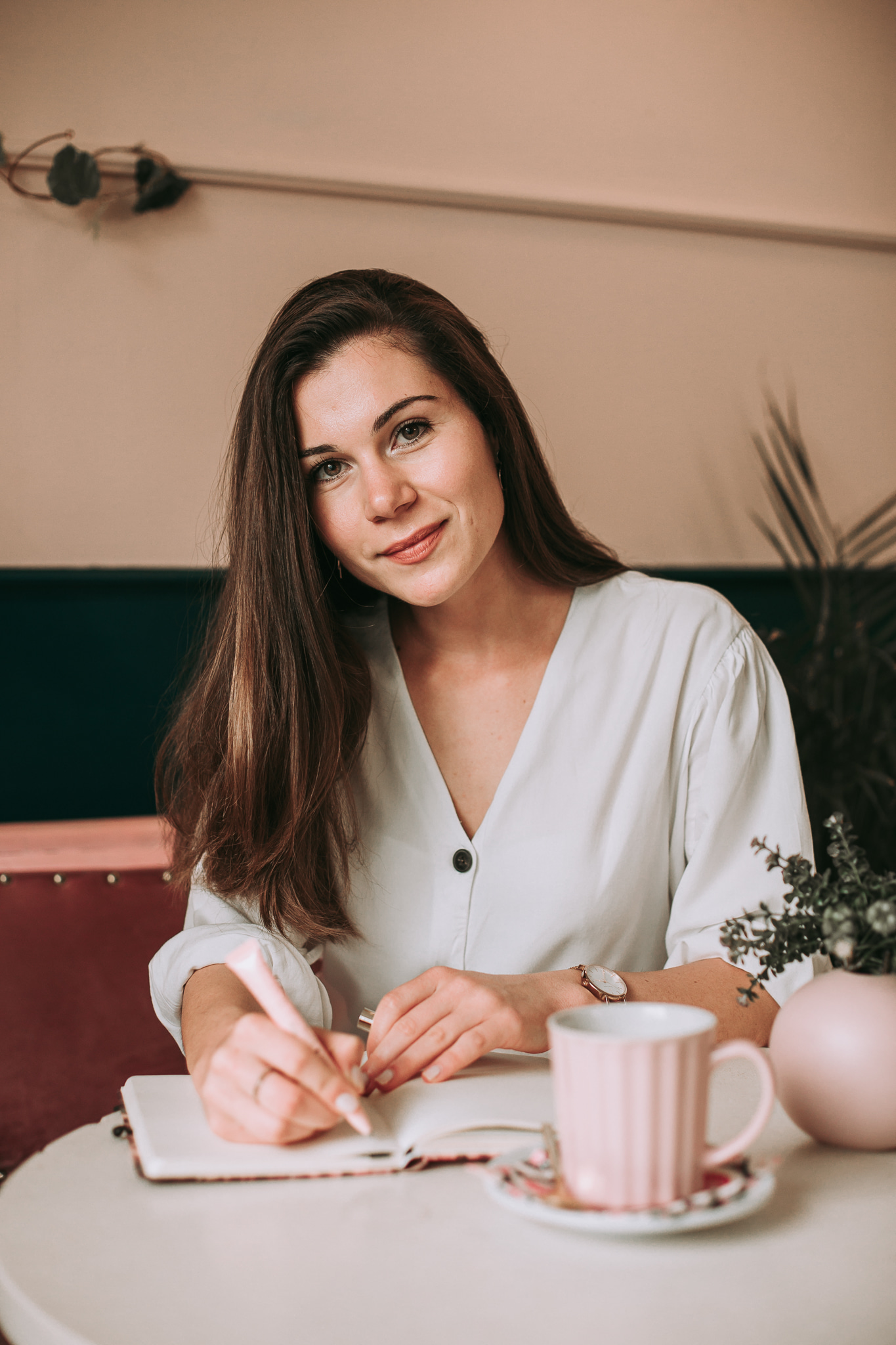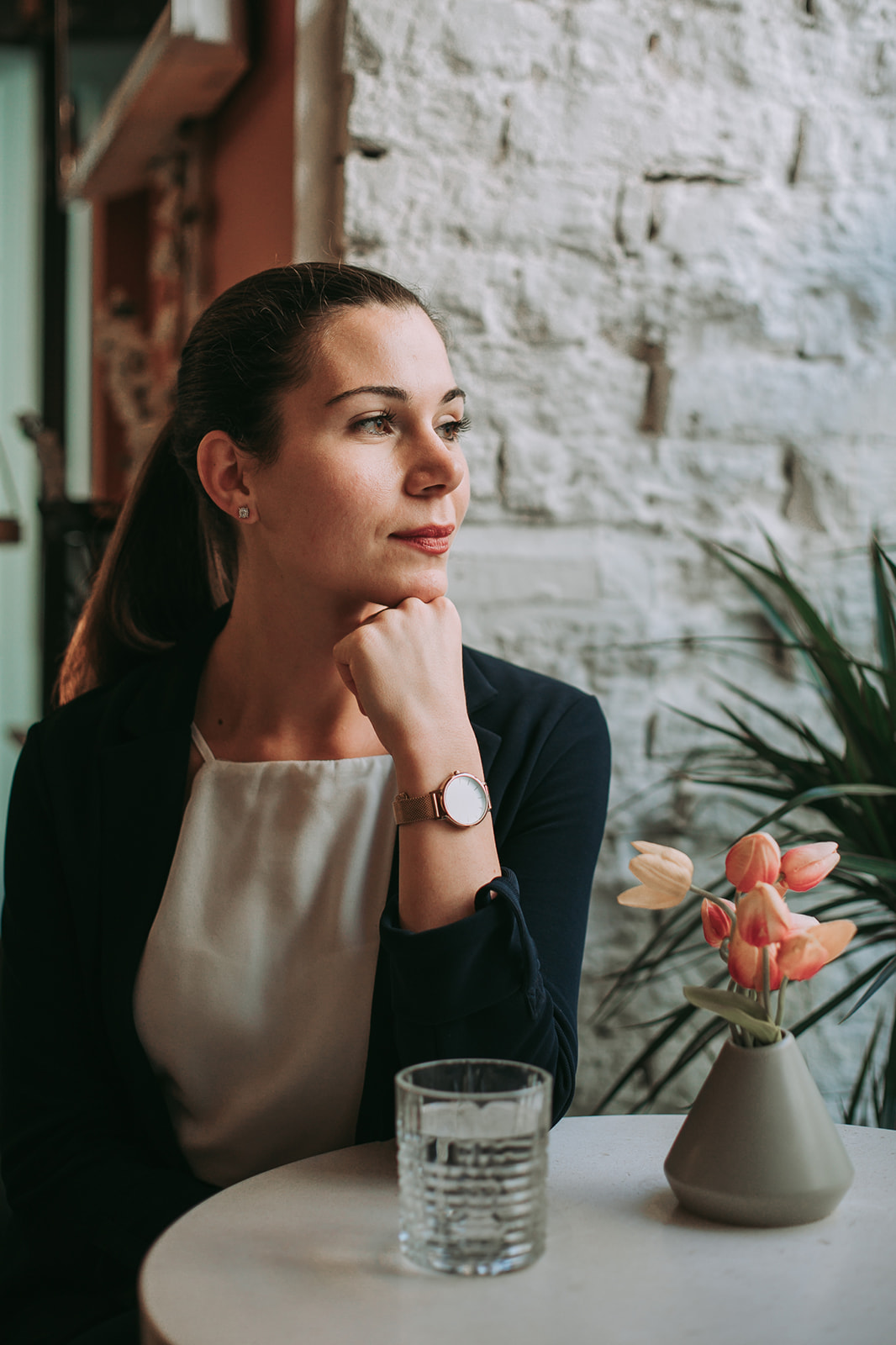Sara Peranić: Don't Blame Your Surroundings for Results You Are Not Satisfied with
June 20, 2021 - One of the most common misconceptions in our society is that any kind of success is the result of an exception, rather than a rule, with a bit of luck and divine intervention thrown into the mix. And yet, according to the latest CEPOR report, there are currently 134.365 thriving micro and small business in Croatia. Meet Sara Peranić, whose business took off - in the middle of the pandemic.
Sara Peranić is a social pedagogue, blogger, founder of the project Licence for Imperfection, and the author of SamopouzdaniJA (English: ConfIdent), an online personal development course for women, with over 8 years of volunteer experience in various nonprofit organizations. She is currently studying to become a certified psychotherapist.
An average person usually comes into contact with social pedagogues at government-run institutions – schools, social welfare centers, youth centers, prisons. Given that social pedagogues mostly work in the public sector, would you say that you have chosen an unorthodox career path? Is there such a thing at all? How did it all come about?
„Create what you miss in the world“ – that was my guiding thought. I truly respect science, but it seems to me sometimes that there is a huge gap between scientific knowledge and people that need that knowledge to improve their lives. So, I see my work as building a bridge between.
On your blog, you describe yourself as a personal development addict. Where did you get the inspiration for your blog and later, your online course SamopouzdaniJa? Also, how much time does it take to come up and create content?
Back in high school, I started watching Ted Talks instead of series that young people usually watch. When I moved to Zagreb I was delighted by the number of various educations, courses, etc. I started volunteering and realized pretty soon that faculty knowledge is just not enough. So I attended all that was offered. After a few years, there was accumulated a lot of experience and knowledge and I just felt like it should be spread. Once I was online and realized how helpful it was for people that were following me, I started studying and reading more than ever. So, it all started as a hobby and soon it grew into a business. My programme SamopouzdaniJA is a result of all my educations, books that I've read, workshops that I attended and created, courses, especially psychotherapy education, and my own psychotherapy experience. It is a combination of counselling, psychotherapy, coaching, and some alternative methods and techniques. I created that programme in 1 month, but the knowledge I poured into was an accumulation of 8 years in self-development and education.

Sara Peranić/private archive
You have launched your blog, Sluša-Lica, in 2019, a year preceding the infamous 2020. Despite the unusual circumstances, you have successfully built a commendable online presence, not through one, but six different channels – your blog, Youtube, Instagram, Facebook, Spotify, and your newsletter. What was it like, being an entrepreneur in that situation?
Interest in topics that I talk about was huge even before the pandemic, but in lockdown, people were enormously looking for some sort of self-help content since the circumstances were very unpredictable. Also, they finally had some time to be with themselves, and various distractions that usually occupy their mind were now removed, so many thoughts and emotions came out. And the reason why I posted on so many platforms is that different people consume different content, some prefer to listen to podcasts, others prefer reading blogs. I always enjoyed writing, while recording podcasts was a huge challenge for me. But, I believe there are only 2 options in life: you challenge yourself the way you choose or life challenges you the way you dislike - your choice. Interestingly, I never thought about developing my business and how was it in the pandemic, all I was thinking about is what do people need and how may I serve them best. Business is the result of that.
I have been following your work for over a year and the idea that you often come back to is, 'It's not about the circumstances, it's about you.' What are your experiences with the Croatian bureaucracy as an independent businesswoman? Is it all truly so bleak? Or is it about the point of view we decide to take?
It's up to us, not the circumstances that we are surrounded by is one of the hardest and most powerful lectures that I learned in psychotherapy school. That does not mean that our bureaucracy in comparison with some other countries is not complicated (and in many ways unlogic), but the point is that some give up on building a business because of that while others build one despite that.

Sara Peranić/private archive
Your unique business model enables you to tailor your schedule to your specific needs and work from practically anywhere in the world. Would you consider yourself a digital nomad?
Absolutely, that is how I see my future self. To be a solopreneur, I think your must-haves are: consistency, time management skills, quick decision-making skill, creativity, financial management, and an enormous responsibility. Once you master that, you can create the life you adore living. (PS, it doesn't mean you start living a perfect life without problems – problems and unpleasant emotions are a part of human life experience).
You are also training to become a psychotherapist. Until the changes of the national legislation in 2018, psychotherapy could, more or less, only be practiced by doctors of medicine. There is still no standalone psychotherapy study program in Croatia. What is the role of psychotherapy with regard to psychology and psychiatry, the other two disciplines which also revolve around the psyche, the human soul?
Psychotherapists and counsellors help people with psychological problems and mental health issues through therapeutic relationships and conversations. Psychiatrists, on the other side, deal with mental illness (diagnoses) and are the only ones that are allowed to give prescriptions. Psychologists are firstly concerned with the normal functioning of the mind and behaviour. Psychologists and psychiatrists can further specialize in psychotherapy. In Croatia, just like in other countries, different psychotherapy schools are associated with European and then World Institutes.
During your years at the university, you started a project Licence for Imperfection, aimed at Croatian high school students. Your current project, SamopouzdaniJA - the first of its kind in our region – has, since its launch about a year ago, brought together an international community of more than 250 women from all walks of life. What do women most commonly struggle with? Are these universal challenges or are there some that have to do with our specific Eastern European mindset?

Sara Peranić/private archive
Even though we are all individuals, we all have some core beliefs that bind us, such as "I am not enough, others are better than me, my body should not look like this, the world is a dangerous place". Also, problems that so many women struggle with are other people's opinions and self-doubting.
A bit more specific for our region is the way we think we „should“ live (school, college, marriage, car, apartment, children, work, work, work, die) and money mindset issues (ex. a lot of money can not be earned fair, money changes people), etc.
You teach women that self-respect and self-confidence are not one and the same, but both require a genuine wish and effort to be developed. Working on yourself is not selfishness, as you say. What is the greatest myth on the journey of self-development that you work on deconstructing?
Self-confidence is a much popular term than self-respect, so many women think they have a problem with confidence, while most of them primarily struggle with self-respect. In my programme SamopouzdaniJA we work on both concepts because even if you believe that you can achieve goals (you have confidence) if you do not have self-esteem, you will not be satisfied when you achieve them. After all, you will still believe that you are not good enough or worthy. On the other side, if you have high self-respect, but low confidence, you will be unsatisfied because you will not be able to achieve your goals.
One of the greatest myths of self-development is surely the one you just mentioned, that if we love ourselves and work on ourselves it means that we are selfish while just the opposite is true. If we do not learn how to respond to our needs and expect others to do that for us, we become people-pleasers, codependent, etc. The other myth is that we are defined by our past and there is nothing we can do about it. The truth is we can do a lot. We can not change what happened in the past, but we can surely change our opinion of what happened and also choose how it will or will not affect us in the future. And lastly, people often believe that they don't have a choice when it comes to feelings. Feelings are not something that affects us from outside but something that we create within us by the way we think. Since we can manage our thoughts we can also change how we feel.

Sara Peranić/private archive
You are soon launching a comprehensive new course which has to do with female leadership, is that right? I notice that you put a lot of importance on the power of the right kind of community. Essentially, we should surround ourselves with people we consider our equals, as being solely around those we strongly admire and think 'above' us can stunt our growth, do you agree?
Currently, I help women build self-confidence and change their lives by changing the relationship they have with themselves. The more I am in business, the more I realize how important self-development is when it comes to growing your business. I am 100% sure that my fast business growth happened because I worked on myself first. So, I decided to create a programme that will help entrepreneurs set up their mindset to achieve big goals while enjoying the process of who they become and what they create. Being an entrepreneur means dealing with fears, negative thoughts, and lots of decisions on a daily basis. The faster you learn how to manage your mind, the faster your business will grow.
If you want to change your results, you have to change who you are. In any aspect of your life.
Speaking of surroundings, I see it a bit differently. I would say that you should surround yourself with people you want to become. For example, if you want to get yourself in good shape, you have to surround yourself with people who regularly go to the gym. If you want to quit drinking, consider not visiting places you used to drink at. If you don't know where to find those people, find them online – you have to start somewhere.
My advice would be: don't ever blame your surroundings for results you are not satisfied with. Your surroundings, just like your results are your responsibility.
For more on Made in Croatia, CLICK HERE.
Number of Beneficiaries of Croatian Self-Employment Support Increases
As Poslovni Dnevnik writes on the 10th of February, 2020, the measures for Croatian self-employment support are experiencing a real boom with more and more people making use of them, according to Martina Gelencir for srednja.hr.
In the last three years, as many as 18,791 beneficiaries have been included in this active employment policy measure. The new year also brought with it some news related to Croatian self-employment support - a larger amount of funds that beneficiaries can receive in less developed areas of Croatia.
Croatian self-employment grants are state aid granted to unemployed persons who decide to start their own business and are registered with the CES. As of 2020, some good news awaits users.
Greater subsidies for those living in underdeveloped areas
''In 2020, greater financial support is being provided for persons wanting to become self employed in less developed areas, thereby affecting the economic development and demographic picture of those areas. Specifically, the amount of Croatian self-employment support is determined by the area in which the person resides and opens a business entity,''
The condition is that for at least 12 months before applying for Croatian self-employment funding, the person must have resided in the area, except in the cases of Index VII and VIII where the above condition doesn't apply. According to the Decision on the classification of local and regional self-government units, and according to the level of development, Croatian self-employment grants are divided into three groups, namely: the first group for municipalities and cities from I to IV; second group V to VI; third group VII to VIII, as was explained from the Croatian Employment Service.
Thus, beneficiaries living in the least developed areas (Grades I to IV) will receive a subsidy of up to 100,000 kuna, or 110,000 kuna if on-the-job training is combined. Beneficiaries in other groups with grades V through VI can receive a subsidy of 85,000 kuna, or up to 95,000 if combined with on-the-job training. The latter, which are the third group of people who live in the most developed areas (Grades VII and VIII), can receive a subsidy of up to 75,000 kuna or up to 85,000 kuna if combined with on-the-job training.
The number of newly enrolled users of Croatian self-employment support is skyrocketing
The main target group for the use of the measure of Croatian self-employment support are unemployed persons registered with the CES, who have carried out all the activities available in the competent regional office (individual counselling, self-employment workshops) in cooperation with the self-employment counsellor in accordance with the dynamics of developing their entrepreneurial idea.
The second target group is Croatian returnees from EU countries with regulated residence, and the condition that a person must have been resident in the area for at least 12 months does not apply in this case.
It is a measure that, according to the CES, is being used by more and more people. Back in 2017, there were 3,583 newcomers to the measure, with 8,723 new users last year. In 2017, a total of 5,824 people benefited from the Croatian self-employment support measures, which is up from 15,069 last year.
According to what the CES has said to srednja.hr, in the past few years, Croatian self-employment grants were most often awarded to businesses in the field of specialised construction, personal services, professional, scientific and technical activities, and in computer programming, consulting and other related activities.
Most continue with their work even after the measure expires
In addition to the increase in the number of beneficiaries of the measure, the good news is that the overwhelming majority of beneficiaries who have received support continue to operate after the first year of operation, ie after the measure expires for them.
Make sure to follow our dedicated lifestyle and business pages for more.


